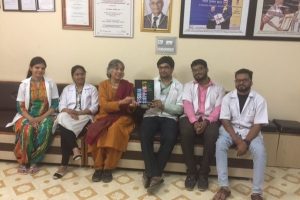-
What We Do
- WHERE WE WORK
-
About Us
 Welcome Message from Carol Jenkins
Welcome Message from Carol JenkinsFor more than 90 years, World Learning has equipped individuals and institutions to address the world’s most pressing problems. We believe that, working together with our partners, we can change this world for the better.
On my travels, I’ve had the opportunity to meet with many of those who have joined us in this mission. In Baghdad, we’ve trained more than 2,300 Iraqi youth who are already giving back at home. In London, our partners in the TAAP Initiative strongly believe that we are all responsible to practice inclusion. And in Vermont, our Experiment in International Living and School for International Training participants prove every day that they have the tools and the determination to change the world.
Please join us in our pursuit of a more peaceful and just world.
- Get Involved
Media Center > Story
Elevating Services for Special Needs Children in India
June 23, 2017
When Asha Asher went to India as a Fulbright Specialist at the beginning of 2017, the veteran occupational therapist and adjunct instructor from Ohio was on a mission to help children with special needs receive better education with support from rehabilitation services.
The problem, as she sees it, wasn’t a lack of skilled therapists or dedicated educators in the remote areas of Kutch district, part of Gujarat state in Western India. It was a lack of awareness and coordination among professionals.
“Therapy focuses on physical rehabilitation. The schools focus on education. But they had minimal contact with each other to understand how they could collaborate,” says Asher, who has 40 years of experience as an occupational therapist.
That’s where the Fulbright Specialist grant came in.
The Shree Bidada Sarvodaya Trust, a non-profit organization providing medical, surgical, and rehabilitation services to patients of all ages from over 1,200 villages in India, invited Asher through the Fulbright Specialist Programto help identify areas where this collaboration could be better supported. The short grant program allowed them to tap into her expertise and facilitate communication between their staff of therapists and special educators to better serve children with multiple disabilities.
During her three week Fulbright Specialist exchange, Asher consulted primarily with the Jaya Rehabilitation Institute and Research Center (JRIRC), a partner facility of the Shree Bidada Sarvodaya Trust, which offers rehabilitation services to villagers in remote areas of Kutch. Through guided discussions with educators from the neighboring areas and therapists from JRIRC, Asher explored the educators’ current needs and determined how these could be supported by the therapists. For example, the educators were often not aware of the educational implications of the various diagnoses their students received from doctors in distant cities. Asher suggested that therapy students interning at JRIRC create brochures explaining various medical conditions and how these impact education. These brochures were shared with schools and the community at large so that students with disabilities could be supported appropriately.

In addition, Asher gave a series of lectures and workshops at colleges and schools to highlight the educational needs of children beyond therapies. The result: a new awareness among physical and occupational therapists and special education teachers about what each one does and how they could work together.
The therapists realized that they couldn’t only focus on physical rehab. Their work needed to be more integrated into the child’s development.
“It’s not enough that a child learns how to walk; they need to learn how to walk to school. It’s not enough that they learn to hold something; they need to learn to hold a pencil so they can learn to write and express their thoughts, using adaptations if needed. That was the awareness I was trying to highlight,” says Asher.
She believes her recommendations will have a multiplier effect. “We started at one rehab center. Now it will snowball and go to other colleges and rehab centers,” she says. Asher observed differences in how the occupational therapists worked with children after participating in the workshops, incorporating educational concepts into therapy sessions such as counting steps and positioning the students for classroom learning.
Since her visit, JRIRC interns have continued to create and distribute educational brochures about how to support students with various disabilities, and therapists are monitoring gains made during therapy.
Asher says she also gained a number of professional insights during her work in India with the Fulbright Specialist Program which she has shared with U.S. colleagues. “To provide needed help, we must first understand the needs of the recipients before deciding what assistance we provide. I found situations where institutions had donated teaching materials which were not appropriate for the age of the population served locally,” she says.
“I also learned that low cost, low tech adaptations can be creatively used to facilitate independence of students with disabilities. Finally, I recognized the need to articulate how specific therapies assist in the education of students with disabilities and that other professionals need to understand our role before they utilize these services,” adds Asher, who shared these insights with colleagues at the American Occupational Therapy Association conference in Philadelphia two weeks after returning from India.
“We’ve got a long way to go but it’s a good start,” she adds.
The Fulbright Specialist Program was established in 2001 by the U.S. Department of State and the Bureau of Educational and Cultural Affairs (ECA) to enable U.S. professionals and scholars to work on short-term projects overseas in conjunction with local host institutions.
For more information about the Fulbright Specialist Program or to apply, please go to: https://fulbrightspecialist.worldlearning.org/the-fulbright-specialist-program/





